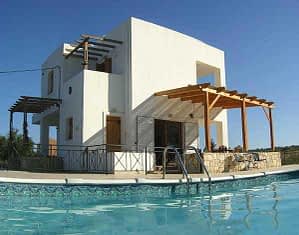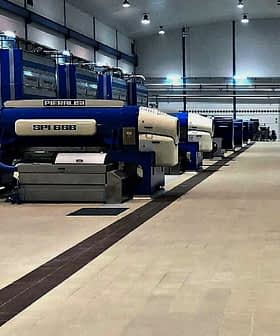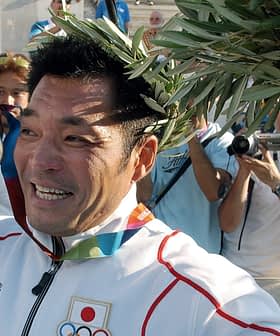In 1978, a skinny leather-clad biker was prowling the floor of the canteen at Havelock House, a Newcastle University residence hall. Marcus Milton had temporarily severed his relationship with the University (code for cocked up his exams) and was displaying his early entrepreneurial tendencies by talking his way into free meal and board from a naive, unsuspecting first-year student (code for me).
 From these inauspicious beginnings via dispatch riding, authoring computer books and writing adverts for Triumph Motorcycles (Marcus), and coal mining, round the world cycling and plundering exotic markets in the Far East (me), a lifetime of friendship found us 30 years later in shorts and T‑shirts in a baking hot mid-November, quaffing Retsina and picking olives from bountiful trees in our very own olive groves in Western Crete. The reason? We are now ‘Accidental Olive Farmers’.
From these inauspicious beginnings via dispatch riding, authoring computer books and writing adverts for Triumph Motorcycles (Marcus), and coal mining, round the world cycling and plundering exotic markets in the Far East (me), a lifetime of friendship found us 30 years later in shorts and T‑shirts in a baking hot mid-November, quaffing Retsina and picking olives from bountiful trees in our very own olive groves in Western Crete. The reason? We are now ‘Accidental Olive Farmers’.
I have to give credit to Marcus and his wife Kirsty for the enviable position we found ourselves in. If not for their decision some 10 years ago to ditch the pressure-cooker existence of running their successful advertising agency for the comparative leisure of owning half of the Peak District (well, a couple of large holiday homes anyway), I would still be flogging my way around Asia selling semiconductor equipment instead of taking a relaxing lunch of fresh bread and feta surrounded by the aforementioned trees in the shadows of the beautiful White Mountains of Crete.
In 2004, Marcus and Kirsty had decided to expand their UK holiday homes business overseas and Crete was their choice of location. I am not sure why they asked me and my wife Tina to join the venture, I like to think it was my renowned business skill and entrepreneurial flair and Tina’s cooking but it was probably that they were short a few quid. After suckering me out of a plate of chips in 1978, Marcus thought he would have no problem suckering me out of a few grand in 2004.
In the beginning, olive oil was the furthest thing from our minds: we find a nice parcel of land, we buy the land, we build some lovely villas and Babis is your Uncle.
 We now had four beautiful rental villas plus a fifth we kept private for ourselves. Each with their own swimming pool, nestled in an olive grove with spectacular mountains surrounding them and the Mediterranean sea just a short stagger down the road. A holiday haven now populated with relaxed, contented guests, enjoying a little bit of paradise we had created for them.
We now had four beautiful rental villas plus a fifth we kept private for ourselves. Each with their own swimming pool, nestled in an olive grove with spectacular mountains surrounding them and the Mediterranean sea just a short stagger down the road. A holiday haven now populated with relaxed, contented guests, enjoying a little bit of paradise we had created for them.
Things were working out but with the success of the villas and the pleasure of frequent trips to Crete for maintenance work and family holidays, we were not seeing the wood for the olive trees. The 200 odd trees on our land were for us a marketing bonus. How much easier to attract people for a holiday to the villas if we could encourage them with images of verdant olive trees providing shade on beautiful summer days. We had something to stick a table and chairs under for a nice lunch in the sun, a selling point and we left it at that.
At the end of our first renting season, the heavily laden trees had to be harvested. Our good friend Christos, son of a local sheep farmer and waiter in our favorite restaurant, was more than happy to do the job in return for 50% of the resulting oil. As for the other 50%? Bung a few liters to friends and family as a Christmas gift and use the remainder ourselves. The ‘remainder’ turned out to be about 300 liters! I pour a lot on my salads, but that is going some!
 Still the light didn’t go on. But then we tasted the oil. Wow! I have tasted a lot of olive oil in my travels around the world — from plastic sachets in American fast food joints to the finest oil at upmarket restaurants in Rome — but this was something special. The look, the taste, the glorious pepper kick. This oil was fantastic and not to be wasted. I was reconciled to eating about 50 bowls of salad a day and force-feeding the neighbor’s dog when someone put their hand up with an idea. Whether it was Marcus, Kirsty or Tina is still disputed but it was certainly not me (I was on my 9th bowl of salad at the time). “We could start an olive oil business,” someone said.
Still the light didn’t go on. But then we tasted the oil. Wow! I have tasted a lot of olive oil in my travels around the world — from plastic sachets in American fast food joints to the finest oil at upmarket restaurants in Rome — but this was something special. The look, the taste, the glorious pepper kick. This oil was fantastic and not to be wasted. I was reconciled to eating about 50 bowls of salad a day and force-feeding the neighbor’s dog when someone put their hand up with an idea. Whether it was Marcus, Kirsty or Tina is still disputed but it was certainly not me (I was on my 9th bowl of salad at the time). “We could start an olive oil business,” someone said.
An olive oil business! The other 3 of us jumped at the idea. We had the trees so we had the product and we had the team. Marcus (an expert advertising writer to promote the business and build the websites), Kirsty (a top-notch graphic designer to create the labels and the look of the bottle), Tina (with a great network of contacts in our target market area) and … someone to make the tea. I put the kettle on and we started to plan.
First up, how were we going to nurture the trees? We were very lucky to have bought land at the base of a mountain. There is little rain for 6 months from April to October which is great for our holiday guests but could be a problem for fruit-bearing olive trees. Not in our case. The locals call our area ‘Dorkes’ in Greek which means something like ‘bowl’ or ‘ditch’ where mountain water is held in the subsoil during the dry months. Our decades-old trees (some over 150 years) have put down deep roots so they can find this water during the hot dry summers.
Our trees seemed to be very productive, with each one spawning an average of 40 kilos of olives. So we had no need to start throwing handfuls of pesticide and fertilizer around to get a good crop. We realized we could be organic! This was an extremely important starting point for us. Nature would do the hard work of putting olives on the trees but how were we going to get them off?
We made an early decision that Marcus and I would do the harvest ourselves — this equates to only about 1½ ‘strapping lads’ and furthermore we were not yet experts, so we needed help. Desperately.
The first choice was an affable local chap Giorgos (George) who owned an olive grove opposite us and is a dab hand at picking. He also spoke excellent English. Giorgos also happens to own a great restaurant in our local seaside village, Almryrida. In a classic case of village bartering and mutual back scratching (which crops up regularly in this venture), we agreed to promote his restaurant to our villa guests in return for a crash course in the art of olive picking.
Day 1 was theory and we passed with flying colors. The following went into our notebooks:
- buy a great big green net and spread it around the tree
- use a big stick or your hands to knock the olives off the tree so they drop onto the big green net
- rake the olives to remove any sticks or leaves
- shovel the olives into cloth sacks
- tie the sacks and load into a van.
If we put our backs into it, we should fill 20 sacks a day. Each sack would make about 10 liters of oil – so that’s 200 liters of oil a day. This was easy! A trip to the local farm shop to buy the above hardware and we were ready!
At about midday on Day 2 with a one-quarter bag filled (slight exaggeration but it was not going well), we realized we needed more muscle. Step up two strapping lads in the shape of ex-pat locals Mark and Andy. Mark and Andy are a key reason why our villa rental business runs like clockwork. They look after the houses and guests throughout the year and our guest comment-book invariably alludes to how great they are. It would be wasteful to overlook their talents (especially as Mark is also a qualified tree-surgeon) so we would get them working in the fields with us in return for as much olive firewood they each needed over the winter. Hurrah! They agreed to join the harvesting team.
Another early decision was to control the process directly ourselves ‘from tree to the bottle’. In other words to be physically present at all times. We took this literally, which meant taking the bags of olives to the factory ourselves and ‘riding shotgun’ while the olives were pressed so we could be assured we really were producing single estate, unblended, unfiltered oil. We had chosen the factory with the best reputation for quality in our region so we knew we were going to get
great oil. We just wanted to make sure it was our great oil.
The next question was transport.
Once picked, the olives must be taken to the factory for processing as fast as possible, otherwise the natural enzymes present begin to ferment and heat up the olives from inside the bag. To minimize this potentially disastrous deterioration, the huge piles of olives we had picked were kept loose on groundsheets. A couple of days saw us collect about 1500 kg. We then bagged the olives in breathable cloth sacks and rushed to the factory. The 3 door hatchback we hired was not going to take kindly to that sort of weight, so we needed a lorry. We didn’t have one of course but the answer was obvious: call Andreas the swimming pool salesman. Andreas has a big white van used to deliver poolside equipment to local customers. Andreas loves olive oil, but has none. We have lots of olive oil but have no lorry. A little more village bartering (which also involved some pleading) and we were on the road to the mountain village where we would find one of the finest olive oil factories in Western Crete.
It is hard to describe the excitement of seeing your own olives loaded into hoppers and watching the fascinating process of turning raw olives into liquid green oil. First, fans blow the excess sticks and leaves away. The olives are cleaned and put through the pressing process at which point you can smell the rich aroma of your own olive oil from the trees you were harvesting that morning. The oil pours out as an opaque green liquid (looking not unlike pond water, it needs a few months to settle before it achieves that beautiful, deep clear green color).
The factory owner himself made up a delicious marinade of fresh oil, freshly squeezed lemon, tomato, and rock salt which he handed to me with a plate of crusty bread. Olives that had been hanging on a tree that very morning were now providing me with a heavenly taste I will remember forever.
Marcus and I sat back, downed a glass of Retsina, and toasted the day we had met 30 years before. He stills owe me for that plate of chips and a night’s accommodation…
You can buy John, Marcus, Kirsty, and Tina’s extra virgin olive oil online from the UK. Visit their website, see photos from the olive harvest and perhaps join them next season in a unique olive picking activity holiday scheduled for November 2010.








